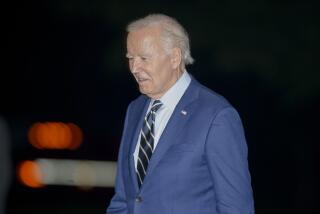In an Embarrassing Turn, Clinton Orders Continued Mideast Efforts
WASHINGTON — On the day he had hoped to preside over the start of a new round of Middle East peace talks, President Clinton instead on Monday directed Secretary of State Madeleine Albright to start anew on the frustrating task of trying to persuade Israel to accept U.S. conditions for a summit.
Albright, who had to cancel plans to accompany Clinton on a trip to Europe starting today, will meet Wednesday in Washington with Israeli Prime Minister Benjamin Netanyahu in the wake of his rejection of a U.S. proposal that the administration had set as a condition for Israeli-Palestinian-U.S. talks.
It was an embarrassing turn of events for Clinton, who had given Netanyahu and Palestinian Authority President Yasser Arafat until Monday to settle a festering interim dispute to clear the way for the start of negotiations over a final peace treaty between the historic antagonists.
Although the Clinton administration had hinted that Washington might end its role as Middle East go-between if the Israelis and Palestinians rejected a U.S. formula to break a 14-month stalemate, Clinton ordered an immediate resumption of U.S. mediation.
Clinton held a White House meeting Monday with his top Middle East strategists--Albright, National Security Advisor Samuel R. “Sandy” Berger and peace envoy Dennis B. Ross, and afterward expressed “regret” that Monday’s planned meeting with Netanyahu and Arafat had fallen through.
In an ill-fated effort last week to break the Mideast deadlock, Albright challenged Israel and the Palestinians to accept a U.S. plan calling for Israel to turn over control of an additional 13% of West Bank land, while urging the Palestinians to exert maximum effort to prevent terrorist attacks on Israeli targets.
Israeli officials on Monday provided more details on a proposal that Netanyahu, who will arrive in the United States on Wednesday for a scheduled five-day visit, is expected to offer. Under the plan, Israel would withdraw from an additional 9% of West Bank territory over a 12-week period and would hold an area constituting 4% in reserve, allowing the U.S. to determine when it should be handed over.
That determination would be made based on how Palestinians comply with a series of obligations, such as cracking down on Palestinian militants. Some Israeli reports suggested that the determination could take six months to a year.
It was unlikely that the Palestinians would accept such an offer. At a news conference Monday in Brussels, Arafat said the Palestinians would be unlikely to go along if Netanyahu persuades Albright to accept additional concessions.
Arafat charged that Netanyahu was trying to “humiliate” Clinton by rejecting the U.S. plan.
Under the terms of the 1993 Israeli-Palestinian peace accords negotiated in Oslo and signed on the White House lawn, Israel is required to cede to the Palestinians more West Bank land, but the amount is not spelled out.
State Department spokesman James P. Rubin said Arafat accepted the U.S. plan entirely, rolling back his territorial demands to Washington’s 13% figure and agreeing to a crackdown. But Netanyahu, asserting that ceding more than 9% of the West Bank would damage Israel’s security, rejected the proposal.
Although administration officials insisted that Albright--who is scheduled to give a speech about the peace process today at the National Press Club in Washington--will not “water down” the U.S. plan to obtain Israeli acceptance, they emphasized that the objective is to find a formula acceptable to both sides.
Still, the aftermath of the administration’s attempt to break the stalemate is fraught with irony. Arafat, who accepted the American plan, is left to stew outside the U.S.; Netanyahu, who rejected the U.S. approach, will spend much of the week in Washington and New York talking to generally appreciative audiences.
Netanyahu’s appearances will include: speeches to the American Israel Public Affairs Committee, the Washington Institute for Near East Policy and the American Jewish Committee; meetings with key members of Congress; and a spate of interviews with the media.
In Jerusalem on Monday, Netanyahu suggested that he will seek to use the trip to show the administration that in any showdown over the terms of peace, he enjoys more U.S. public support than Clinton does.
“At the end of the day, in matters of security, it is Israel that must decide, and I think this is the view shared by, frankly, the people of America and, I would like to believe, also the government of the United States,” Netanyahu said.
*
Times staff writer Rebecca Trounson in Jerusalem contributed to this report.
More to Read
Sign up for Essential California
The most important California stories and recommendations in your inbox every morning.
You may occasionally receive promotional content from the Los Angeles Times.










